#meta sexy
Text
Ideology of Exceptionalism and Gravity Falls; meta and character analysis

I had a whole ago read a post by @icanlife that had a quote by Alex Hirsch on Ford's greatest flaw, and wanted to explore what the flaw is, which is the ideology of exceptionalism; in the exploration, I’ll touch on what it is and how it is used in abusive relationships and cults, as well as how it drives multiple Gravity Falls characters and consequently how it impacts relationships between these characters, and how the show ultimately refutes exceptionalism.
Quick note here; I am not in any way, shape or form a psychologist nor have any formal training in psychology; this is written from my own experiences with this ideology and my own forays into psychology and trauma-informed learning. It is also written with a loose understanding that is likely not broad enough to cover all references to cults, extremist groups and abusive relationships.
The Ideology of Exceptionalism
First of all, we have to get through a drier bit, which is… what is the ideology of exceptionalism and how does it arise? Might be fairly obvious, but it is the belief that you are, or belong to, a group of exceptional people, thus more important and worth more than anyone else; ie, those who don't qualify as 'exceptional'. It is often a subconsciously learned ideology. Now, what qualifies one as exceptional can be extremely varied; generally it revolves around something that provides some form of privilege. Thus, it might be, as the main exceptionalist idea in Gravity Falls, 'intelligence', or power, or it can be such things as attractiveness, quantity of money one has, species, nationality, or skin colour and ancestral heritage. The ideology of exceptionalism, being by nature hierarchical, devalues, and at its worst, openly and violently dehumanizes those who do not qualify as exceptional.
For why exceptionalism occurs is an extremely broad topic, but I've personally found that, for exceptionalism revolving around intelligence, it's a result of a poor sense of self-worth, and having one's self-worth tied to what makes one exceptional. Poor self-worth itself (again, broadly) is a result of childhood trauma from a lack of positive affirmation and unfulfillment of the emotional needs of the child. Meanwhile, self-worth becoming tied to the quality of exceptionalism generally is a result of when positive affirmation was pretty much solely provided around their 'exceptionalism', especially when provided derogatory commentary, or a blatant example of how they would be treated if they aren't 'exceptional'. As a result of the general lack of affirmation, self-worth then becomes often solely reliant on the qualities of exceptionalism, as that is the only way for the child (and later, adult) to get affirmation of their worth, as well as out of fear of being ‘not worth anything’ like the examples of ‘non-exceptional’ people they have been given.
This is especially likely to occur when the child is a social outcast; the adoption of the hierarchical ideology of exceptionalism, and the devaluation/dehumanization of others often occurs subconsciously as an avoidance/minimization tactic from pain. This is to say, the child, and later the adult (if healthy self-worth is not established) goes 'it doesn't matter what the non-exceptional people say or if they accept me since I matter more than them because of my exceptionality'. It can even be taken further, that being shunned is part of one's exceptionalism, and becomes part of the qualifier of being exceptional. For instance, 'they just can't understand because they aren't exceptional and that's just a part of being exceptional'. This idea also neatly tailors into the part of the concept of being better then others means you are separate from others; this can be taken that someone who is special, needs to be alone to be truly special.
Obviously, exceptionalism is not a healthy coping mechanism for poor self-worth, as often such people constantly feel the need to prove and show off their exceptionalism to gain that affirmation and avoid rejection, which is stressful. As well, it often negatively impacts their relationships with other people as a result of the arrogance of believing that they are better than most others, or even deliberate sabotage due to their arrogance. This occurs as they flatten the complexity of human experience to black-and-white hierarchical categories of exceptional/not-exceptional through constant judgement of those they meet, and often refuse to engage with people who don't belong to their 'exceptionality', or even people they simply don't like, even if they technically qualify. Generally, those that they do like or have close relationships with, often due to being similar, are automatically labelled as 'exceptional'. Those judged as ‘exceptional’ also become privy to the open judgements of ‘non-exceptional’ others, out of a subconscious belief by the exceptionalist that the other believes similarly; something that may strain their relationship if the other doesn’t ascribe to exceptionalism. This all culminates in the exceptionalist being blind or even adverse to the diversity of experiences, which makes it difficult to create relationships and community outside of echo chambers of their own beliefs (if they can even find this), and subsequently, these people are often isolated and have very few to no close relationships with people.
However, all humans require connections with other people, relationships where one can rely on others emotionally and physically if needed and feel accepted; they also require to feel like they are worth something, that their life has meaning. Lacking meaningful connections and having a crippled sense of self-worth, a deep yearning hole is left in these people. Exceptionalism, especially as it is a narrative constantly pushed by Western society as it validates hierarchies, is then employed as a (often subconscious) trauma response to assuage this yearning hole, with arrogance and denial. And depending on the circumstances, it can be a very strong and definitive trauma response for people.
This isolation and lack of self-worth is catnip to abusive relationships, including cults and extremist groups. These types of relationships often heavily rely on isolating their victims or pulling them into echo chambers of solely the abuser’s rhetoric, to redefine what is healthy through gaslighting; as the exceptionalists are already isolated, this makes them extremely susceptible. They also often provide these people affirmation, and in these cases especially about their exceptionalism, thus confirming their self-worth, their 'specialness', while also providing them the connection they have been lacking, either through the cult community or through the abuser’s own presence. These emotional needs, which haven’t been met in a long time, if ever, begin to be fulfilled; something that abusive relationships and cults hinge on, rather than any form of logic.
Ideology of Exceptionalism and Gravity Falls
The main characters within Gravity Falls which are heavily ascribed to exceptionalism would be both Ford and Bill; this characterization deeply impacts the story and their relationships with others (technically the Northwest are another case regarding wealth, but less directly impact the storyline and thus tangential; Gideon also is an example, but as a mirror of Bill). With each of these characters I’ll go into detail within their sections on the way they began to ascribe to exceptionalism, and how it plays out later in their relationships; I will first begin with Ford, then move to Bill. Then, to cap it off, I’ll go into the characterization of Stan and the way Gravity Falls refutes exceptionalism.
Ford and Exceptionalism
Firstly, the quote from Alex Hirsch that kicked this whole baby off, as mentioned previously;
“Ford sees Dipper as someone who’s special like himself. That’s Ford’s great flaw, his arrogance is he believes that there’s special people, and everyone else. That human attachments are actually weaknesses. And the song and dance that he’s giving Dipper right now, is the song and dance that he gave McGucket, back when they were younger… ‘You and me are different, we’re better than everyone else. We have a path that no one else can understand, and only us can do this.’ It’s a very seductive idea for Dipper… Dipper is a smart kid, but Ford’s projecting. Ford loves Dipper because he sees someone who’ll tell him ‘yes’ to everything. Who’ll never challenge him, who’ll do a really insane dangerous mission.”
Very blatantly Alex Hirsch calls Ford out on his arrogance in the belief that he is special, in his belief in the 'lone hero' complex, in his belief in exceptionalism. And really, it should be no surprise that Ford does so, considering the way he's depicted as a social outcast as a child (other than Stan), and the way his parents have been clearly shown to be not particularly emotionally supportive (“I’m not impressed”); they don't provide positive affirmation except for his intelligence (mostly due to the possibility of money making through it…), while also actively comparing him to Stan who is derogatorily ‘not-exceptional’, and ‘worth less’. This all sets Ford’s self-worth up to be fragile, and other than Stan who wholeheartedly accepts him, he is isolated and invalidated; plus, the only other validation he receives is around his intelligence. All very classically fitting the profile for exceptionalism.

Image id: Stand and Ford when they were children, both clearly enjoying each other's company.
Ford’s belief in his exceptionalism catalyzes after the shattering of his and Stan’s relationship. Previously the twins are shown to do everything together, having a very close caring relationship; something unlikely if Ford thought he was better than Stan. Also, when Ford is talked to about his opportunities, Ford looks uncomfortable at the way they talk about Stan as inferior, compared to how he himself is being praised; but in the offer he’s simultaneously finally being validated, he’s being told he’s someone worth something, and he’s going to be someone worth something after this. And then the science fair incident occurs, and Ford loses that validation from his parents, from the judges and a future of more validation; after being promised validation and acceptance, it slips through his fingers. And in his anger of being denied that, it becomes easy to begin to slip subconsciously into the rhetoric the others have been feeding him; that he’s exceptional, that Stan isn’t, and he deserved to be recognized for his worth. So he breaks the relationship with the only person who accepted and validated him for who he is. With that loss of previous support, Ford becomes then deeply obsessed with proving his exceptionalism to the world to assuage that fragile self-worth, to become accepted, or even better, revered, confirming that he is someone of worth, someone special, like he was promised.
Ford’s obsession also doubly functions as a way to alleviate his guilt over shattering their relationship; if he’s exceptional as he believes, then he’s within the right to respond the way he did, as he’s worth more than Stan, he's better off alone, and he has a right to be angry over being denied that validation. As well, in much the same way as it is used as a way to alleviate his guilt over the end of their relationship, it is also likely used in a way to minimize the pain of being ostracized (although not directly depicted); afterall, Ford’s keenly aware and insecure about his social ineptitude and his six fingers as things that make him different from other people, case in point with his experience visiting Lazy Susans Diner. Thus it wouldn’t be unsurprising if he uses the idea of being worth more than those who ostracize him to imply it ‘doesn’t matter’ what they think. His ostracization by nature keeps him from generally forming close relationships, with the exception of Fiddleford (who much like him, is socially outcast, and intelligent) during his university days. As a result, he's isolated and acutely lonely, having lost Stan.

Image id: One of the missing Journal 3 pages in TBOB, detailing Ford's botched social interaction in Lazy Susans Diner. In the background is the print of his six-fingered hand.
In his obsession over being acknowledged, Ford, like many others who believe in exceptionalism, identifies strongly with the causes of his ostracization (his intelligence, his six-fingeredness) as part of, or wholly, makes him exceptional. It is obvious through his choice of study; with the grant he has been gifted, he chooses to revolve his work around the weird, the outcast, something that you see Ford gravitate towards being an outcast and deemed 'weird' himself (which in Journal 3 he openly talks about). Something that can be, much like him, framed as 'exceptional'. His work is even recorded in a journal that Ford deliberately chooses to put his six-fingered hand on the cover of. Intertwined with the way it becomes adopted into the idea of exceptionalism, is the keen loneliness from his ostracization and a deep desire to be accepted and a wish to find a community of other weird people.

Image id: Two pages from journal 3, labelled 'Myself', in which Ford is open about being weird, and a social outcast, while also noting his ambitions and that 'Gravity Falls, [is] the place that I fit in.'
Ford and Bill
All of this culminates in Ford becoming an incredibly easy target to manipulate by Bill. He’s desperate to be acknowledged (and thus accepted) by an authority figure so that his belief in exceptionalism is justified and his self-worth confirmed. And he knows he’s intelligent, that he's exceptional because people have told him so, but he just needs to prove it with something that shakes the world. And the grant is finally his second chance after the fair, but he's stuck, and the research is going nowhere, and he's in a town where he doesn't really know anyone and he’s so terribly lonely. And sure, he clings to his exceptionalism but if he can't even prove it then is he really exceptional? Is he even worth anything like he thought he was? And what about what he's left behind, rejected, because of his exceptionalism?
And THEN he finds an incantation and he ignores the warnings because maybe, just maybe, this will be his break to get that acceptance/validation he has been chasing his whole life?
And then it's better than that.
A god, essentially, shows himself to him, an ultimate figure of authority. And he tells him that yes, he is special, he’s worth more than other people, and Bill’s only showing himself to Ford because he is so much more intelligent than anyone else. Ford is suddenly getting his exceptionalism confirmed by a god of ancient knowledge, an immensely intelligent interdimensional being, and he’s also showering him with affirmations, specifically affirmations around what Ford's fragile self-worth is based on. And even better, he's delighted by Ford's six-fingeredness; he's not put off at all, it even becomes his main nickname for Ford, just like it used to be for Stan all those years ago. On top of it all, Ford's own social ineptitude doesn't phase Bill, another thing Ford is self-conscious about; Bill's own social ineptitude as he's not human probably makes Ford feel comfortable, knowing that's not expected from him.
Through Bill, not only does Ford find someone who validates his self-worth through intelligence and even confirms to him that his weirdness is part and parcel of making him special, he also finds someone who he regularly (generally) is in contact with, who enjoys talking to him and even banters with him familiarly. Hell, Bill even deliberately goes out of his way (literally possessing a whole wack ton of rats, then dream karaoke) to celebrate his birthday with him; how long do you think Ford has simply skipped his birthday since he had no one to really celebrate it with? The loneliness, beneath his arrogance and belief in exceptionalism, is being fulfilled; for the first time since Ford was a teenager, he's fully accepted by someone, social awkwardness, six fingers, exceptionalism and all.

Image id: One of the lost pages from Journal 3 in TBOB, the 'one thing led to another' page, with Bill and Ford singing karaoke and drinking together, both clearly enjoying themselves; Bill has an arm slung around Ford's shoulders.
So it's really no surprise at all that Ford fell for this, hook line and sinker. Hell, if I was in Ford's shoes I would fall for it just as hard. And I've seen a few posts floating around talking about how Bill is bad at manipulating, and no, he's not. He was able to pinpoint exactly what Ford wanted and needed, and provided that, was charismatic enough to provide that. Again, manipulation isn't about logic. It really isn't; it's about the emotional core in people, what people lack and what you can give them to slowly reel them in to sing your dance and song. And people will ignore vast swaths of red flags when you're finally being accepted, when you're finally getting your emotional needs met at least in some way or form. It's better than not having them met at all, such as previously. So Ford worshipping Bill is really not a surprise, especially as Bill deliberately stoked it.
All of this is part of why you see Alex Hirsch call Ford's belief in his exceptionalism his greatest flaw; because it allowed him to be very easily manipulated by Bill, and by its nature kept Ford isolated from others, evident by his arrogance in assuming he knows best and refusing to see other people who aren't as 'intelligent/weird' as him as worth getting to know, listen too and even reach out to ask help from, it's him believing he has to be the lone hero as someone whose 'special'. It's something that blinds him to the danger of his work around the weirdness of gravity falls because he’s desperate to seek a place where he and his weirdness belong, and it's something that plays out in each and every relationship he has because it's something he clings to so deeply. It's what cost him his relationship with Stan, who previously accepted him completely, and, as he's disinclined to form new relationships and as Bill actively strokes his paranoia (Trust No One…), ultimately further increases the hold Bill has over him. It's only Fiddleford’s presence as he works with Ford that allows him some form of outside reference and reprieve from solely Bill’s influence, something that Bill resents deeply and is clearly jealous and angry about, even if Fiddleford is helping create the portal. And it's ultimately Fiddleford, once he was aware enough of what was happening, calls Ford out on it, seriously jeopardizing Bill's influence over Ford; but Ford is too invested in the portal, in chasing his own ambition and caught up in Bill’s manipulation to take him seriously, until the incident with the trial, and Ford beginning to hear other voices then Bill.
Ford’s Exceptionalism and Wider Relationships
Now back to how it plays out in all Ford's relationships; we've already gone over it with Bill's influence, because it made him extremely easy to manipulate, and with his disregard of Stan in favor of validation of his exceptionalism. But Ford, as pointed out by Alex Hirsch, also exerts the ideology's seductive rhetoric to both Fiddleford and Dipper (who look up to Ford) in a similar way that Bill does with him (although there is a difference of it being used intentionally and maliciously, compared to subconsciously and earnestly, even if it is problematic). Ford, with his black-and-white view of exceptionalism, sees both Fiddleford and Dipper as people who are like him; 'exceptional', and so he treats them as such, and uses this rhetoric to coerce them into helping him.
For Fiddleford, the lure is how he can change the world, how he can be finally acknowledged if he helps Ford with the portal. And it works well; he willingly chooses to leave his own work and his wife and young son, to work with Ford. Much like Ford, Fiddleford himself is also a social outcast and regularly presumed less smart than he is, and he’s got a chip on his shoulder to prove himself, to gain acknowledgement and recognition from the world at large. Although Fiddleford has a family which presumes he’s not entirely lonely like Ford is, he also clearly has deep feelings for Ford, some which are hinted to be more than just ‘friendly’ feelings; it is likely the combination of the lure of validation and spending time with Ford, a kindred spirit that accepts him and an old friend/crush, that causes him to agree (afterall, it was Ford who made Fiddleford feel accepted and choose to stay at Backupsmore). And Fiddleford’s not even considered a partner, but rather an assistant to Ford due to Ford's arrogance, and he still drops everything to go! It’s more about their relationship and connection rather than validation, but that doesn’t stop Ford from espousing exceptionalism. And this is a distinguishing difference, because although Fiddleford would like recognition, he’s not there solely because of it; he’s not a believer in exceptionalism nor arrogant about his skills, and so, unlike Ford who is blinded by his obsession, he’s much more aware of the dangers of the weirdness of Gravity Falls. Thus, he's actively calculating the risks involved, and when he realizes there could be potentially devastating consequences of the portal, he attempts to talk Ford out of it; this fails due to Ford’s own denial and obsession over the portal. In the end, it all goes terribly sideways, and Fiddleford ends up losing everything he had; his wife, his son, his friend, his memories and himself to the trauma he had experienced at the invitation of his friend with the lure of validation and company, due to the memory gun he had created himself.
As for Dipper, much like Ford, he also has issues with self-worth (many of the episodes deal with Dipper finding self-worth; ie, the manotaur episode), has a physical oddity (his birthmark) and by far the trait he relies on most for worth is his intelligence (for example, in one episode he rubs it into Mabel's face over and over again in beating her in games). He's also extremely desperate to be recognized by authority figures as someone intelligent, case in point when he summons the dead after being made fun of by the government agents to try and show them that the information he's gathered is important after Stan dismisses his knowledge. This desperation to be seen as someone of worth from Dipper, much like Ford, extends to the need to be a hero, something he even says at the end of the zombie episode; yet, due to Mabel, unlike Ford he's not a lone hero, and Mabel also half the time acts as the hero.

Image id: Zombies crawling out of a crack after Dipper summons them; Dipper and the two agents look on in horror.
It all culminates in Dipper hero-worshipping Ford when he returns; really, no different than Ford worshipping Bill. And Ford clearly finds it extremely flattering; Dipper's attention and amazement of him feeds his exceptionalism. Exactly how Ford responded to Bill, Dipper is willing to do anything for Ford, excited too, in an attempt to impress Ford and be validated and accepted. And for Ford, that's an extremely heady feeling, especially as someone who has been constantly alone the last 30 years, especially when he had one previously confirm his exceptionalism all those years ago and stopped, and now someone is once again affirming that idea. And Ford doesn't have to be alone again, because he's found a kindred spirit in Dipper as his assistant, someone ‘just’ like him, someone who is exceptional. Because he sees himself in Dipper, he begins to espouse exceptionalism unconsciously, by praising Dipper's own intellect and adventurous spirit, assuaging his feeling of self-worth, while also telling him he's more important or better than others because of it.
And it's seductive to Dipper, because he wants to hear those affirmations of his self-worth, especially as he hero-worships him, but Dipper isn't sold on it, because it means leaving Mabel behind, it means believing that he's worth more than Mabel (and also, Stan, and all his friends he’s made in Gravity Falls). It's ultimately because of his relationship with Mabel that he rejects the ideology; he's not isolated the way Ford was with Bill, and he's not willing to break that relationship for that acknowledgement, because his relationships matter more to him.
Bill and Exceptionalism
Now of course, that's only on the Pines; what about Bill?
While it's obvious that Bill uses exceptionalism as a main manipulative tactic, it's not just an ideology he sprouts emptily; it's also an ideology he believes in, just like Ford, although it's less based on intellectual exceptionalism, and more on power and 'weirdness'.
This most distinctly can be seen in Bill's denial about what happened to his home dimension; Bill's belief in his exceptionalism occurs as a pain avoidance tactic from killing his whole dimension. Bill was clearly a social outcast within his dimension due to being able to see 3d; he's not accepted, and not trusted, to the point that there is medical intervention to make him blind. That's a deeply traumatic experience that completely erases one sense of self-worth, where one’s sanity is called into question by your parents on something that is not harmful, that's beautiful and you just want to share with them. It's a deep and clear rejection of who Bill is, and his ability. As a result, out of a desperate bid to be understood and accepted, he ends up trying to show them the stars. And it ends up killing everyone.

Image id: Page of TBOB, on 'The Early Years' which notes that Bill was an oddity for seeing 3d, something that was illegal to speak about. Bill frames it as something that made him 'special' and better than all the others.
Traumatized, and originally rejected by the dimension, he instead weaves an excuse of exceptionalism; that it doesn't matter what he did to them because he's exceptional and he's worth more than all of them because he can see 3d, because he's powerful, so he shouldn't/'doesn't' feel any remorse about it. With such a traumatic result of trying to be accepted by people, he rejects the idea of trying to be accepted for who he really is; instead adopting a facade of a monster that he believes he is (and eventually, becomes).
Even if he clings to the delusion of exceptionalism, and shuns attempts to find true acceptance, he still wants it; and that's where his henchmaniacs fit in, as they're all, as Bill's noted when trying desperately to get Ford to join him, weird; each has something 'wrong' with them, which is why Bill accepted them as his lackeys (although it's not like we know the context around these). It's a surface-level acceptance however, one more predicated on fear than emotional acceptance. He's taken his 'weirdness', much like many do who believe in exceptionalism,as ‘part of what makes him exceptional'.
In the same way that Ford wants to show the world that he's smart and intelligent by building the portal, Bill does so by wreaking havoc and taking over existences as a way to show the world that he's powerful, that he's someone to be reckoned with, that he's not someone to be ignored because he's someone who's worth more than others. If you can't be loved and accepted, then being hated and feared is better than being ignored; acknowledgement at least approaches acceptance, it's validation of some sort of worth. It also functions as deliberate self-sabotage of his morals, by proving that he is the monster that killed his entire dimension; if that's what he is, then that's who he's going to be, because if he wasn’t, then he has to come face to face with his remorse over what he did to his dimension and his whole house of cards around his exceptionalism and not caring collapses. So instead he keeps feeding the delusions the denial, and lies and lies and lies and keeps lying to ignore all of it, to wrap himself in this shroud of exceptionalism and brutality as a way to function. And it somewhat works, because he's mostly deluded himself about it all, even if subconsciously he knows.
And of course, this display of Bill's exceptionalism is what brings Bill to earth, to Gravity Falls, and to manipulating humans. In meddling with earth and humanity, beyond Bill's goal of taking over earth and fleeing his own unravelling dimension, he also enjoys reaping the benefits of being worshiped by humans, who find him awe-inspiring. Their amazement of who he is, and Bill's own posturing and manipulation of people leads to Bill literally forming cults (ie ciphertology) or having apprentices that worship/find him (to varying degree) inspiring; all reinforcing his feelings of exceptionalism.
Of course, Ford numbers among these people; he praises Bill and worships him, as he's played like a fiddle by Bill, because his self-worth and belief in exceptionalism is fucked up in a way that perfectly resonates with Bill’s. Because it's the exact same types of issues around self-worth, around being an outcast, being weird and wrong physically, and yet at the same time gifted. And Ford clearly is incredibly lonely and yearning for acceptance, but so is Bill; since the beginning he's been trying to find someone who would accept him, even if he's given up on it. And for his song and dance to entice Ford in, he pretends he's not crushed dimensions for fun, that he's not a 'monster'; a version of him he buried after he had tried to show his parents the stars, one that he occasionally resurrects and puppets around for manipulation (all lies are better when they have a grain of truth). And this version of him is worshipped, but above all is accepted, is loved by Ford. The softer parts of Bill, even if they are still weird as fuck, the parts that were never far beneath the surface for all his deluding, become loved by Ford. Much as Ford becomes hooked on Bill’s praise, Bill also becomes hooked on Ford's genuine love and care. It becomes personal, unlike any previous ‘inspirations’ and Bill over time gets to the point that he feels accepted, safe enough with Ford to share about his dimension much more close to the truth then he did with any of his henchmaniacs. He becomes vulnerable with Ford, in response to Ford’s own vulnerability with him. He’s finding acceptance for the first time in his life around the softer parts of himself, not just the feared acknowledgement that comes from his dimensions conquering; much like Ford is finally finding companionship and acceptance with Bill, not just only intellectual validation. Bill's also for once, not just self-serving; he cares, and goes out of his way to take time with Ford, even celebrating Ford's birthday (in the unique way he does things), both with the rats and the karaoke.

Image id: One of the lost Journal 3 pages in TBOB. Ford recounts Bill talking about the destruction of his dimension, and calls himself by implication a monster.
They're both fulfilling each other's emotional needs, needs which both of them have struggled with most, if not all of their lives (although their relationship is certainly not healthy, considering it's codependent as fuck, riddled with exceptionalism and oodles of power imbalance issues). And suddenly, against Bill's plans, Ford's no longer just a disposable pawn, but someone Bill wants as part of his team, someone by his side, closer than his henchmaniacs are. He's unwittingly fallen for Ford, and so when everything goes sideways in his plan, and Ford swears it off, suddenly cutting off their relationship and that acceptance Bill had finally felt, he spirals into grief and anger from the rejection. As a result, he becomes extremely abusive to Ford in desperate attempts to continue their relationship, and ultimately he becomes obsessive over Ford joining him again as Ford continues to refuse, as evidenced by both Weirdmageddon and the Book of Bill.
Stanley Pines, and the Refuting of Exceptionalism
Exceptionalism, being a negative driving factor behind many core character dynamics, is ultimately refuted by the show. This occurs multiple times over the show, such as with Mabel in the Pioneer Day episode, especially compared to Pacifica, but mostly through Stan's characterization. Stan is someone who has been since the beginning characterized (if lovingly so) as someone who is a failure by societal standards; he’s an older man running a run-down tacky tourist shop to swindle gullible tourists out of their money, has multiple divorces, has an ongoing feud with a literal 12 year old, clearly has had multiple mishaps with the law (some ongoing), is generally pretty self-serving and is extremely lonely and really had no close relationships until Mabel and Dipper showed up. He's not exceptional; he's not even what we would consider 'decent' enough to have a 'typical, hard working job’. In short, he’s a failure, a stark difference to the idea of 'exceptionalism' that characterizes Ford. If he's gifted in any area, it would be charisma (debatedly), not anything else.
But it's still Stan who rebuilds the portal from literally only one journal (not all three!) and gets it to work. It even seems like he only needs some codes from the other two journals when he does get them, suggesting that he was able to extrapolate from what was left and the first journal’s blueprints to fix it entirely, something that is extremely difficult and technically complicated (Ford, Bill and Fiddleford all worked on it together!). Stan's able to do it, even if it's been shown he's not 'naturally' gifted in that area. And it's something he does as a result of his deep care for Ford; because even after their fights, he cares about Ford and wants to right his wrongs, believes he should, because of his whole life of being defined as a failure and even worse than that, screwing up his ‘exceptional’ brother’s life. And he’ll do it even if that means learning how to build an interdimensional portal, even if it takes up thirty years of his life doing so, and he doesn't waver. Much of this is connected to his own complexes around being deemed a failure compared to Ford, having failed to succeed in his life, and how he feels that he needs to atone for screwing up Ford’s life, now for the second time; but beneath it all, he also cares. Much like Ford, he's extremely lonely, but he's not blinded by Ford's arrogance, and as a result he wants to make sure Ford's safe, because that's what he used to do, they’re twins, they grew up together, they once they had fully accepted and cared for each other, and dammit that still means something, and Stan hasn't found that depth of emotional connection since. So if possible, he wants to rekindle that closeness they had, but first, he needs to bring Ford back.
And in the end, it's not Ford's own special gun he built using his intelligence that 'kills' Bill. It's Stan, someone who Ford had long ago broke it off with in search of validation of his exceptionalism, someone who both Ford and Bill labelled as 'not-exceptional', who defeats Bill. It's exceptionalism's devaluation of people who are 'not-exceptional' that causes Bill to underestimate the Pines beyond Ford, and it's only when Ford put aside his exceptionalism and his refusal to accept and trust 'non-exceptional' people, that is, trust Stan once more, that causes Bill to end up defeated by Stan.
In the end, it's not about who's 'smarter'; it's a reminder that everyone has different skills and are better at different things, but that doesn't diminish one's worth or value, and that just because someone isn't naturally 'gifted' in an area doesn't mean they can't learn or use different ways to get around obstacles. Ultimately, it comes down to that no one is worth more or less than other people; exceptionalism is a lie. It’s a lie and an excuse, and it's certainly not a healthy way to assuage one's poor self-worth. What does matter is creating positive healthy connections with other people, and caring about them. This creates a community where you can be yourself and be emotionally fulfilled through these connections; and when opposition does arise, you become able to fight it together, and fight so much stronger than if you are alone.
And by the end of the show, you see that. Ford begins to let go of the ideal of exceptionalism and its black-and-white categorization; finally recognizes his own faults around prioritizing validation of his intelligence and exceptionalism over his relationships, and finally, after all the years, chooses to create and rekindle positive relationships with people, trust people, and make amends. And in the end, he goes sailing with Stan, prioritizing their relationship, finally fulfilling their childhood promise.

Image id: One of the pages written by Ford into TBOB. Ford refutes Bill's idea of happiness, and says he has finally found his own happiness, and it looks like the photo taped in, of Stan, Ford, Dipper, Mabel, Soos and Wendy, all smiling together.
TLDR: Exceptionalism, an ideology of categorizing people into being special and worth more vs plebian and worth less, is a trauma response and subconscious ideology that characterizes Ford and Bill’s lives, deeply impacting all their relationships as it is used to coerce people into doing what they want, makes Ford easily manipulated, and breaks relationships through their arrogance. It is ultimately denounced through the way Dipper chooses to reject Ford’s offer and his rhetoric of being exceptional, and through the way it's not Ford’s intelligence, but rather Stan, who has been labeled as 'not-exceptional' and a failure at life, that defeats Bill through trickery. It's a reminder that everyone has worth, and no one is worth more than other people, even if one may be gifted in certain areas; the ideology of exceptionalism is fragile and a lie. In the end, creating a caring, loving community around oneself is where strength truly lies, as is seen with the deep care and love the characters have for each other, and the repairing of Ford and Stans relationship.
Thanks to the lovely @eshtaresht who deigned to beta read this monster of a post for me
If you enjoyed this meta, (first of all if you read all this you're a champ!) I've also done another gf meta post! (It's shorter I swear)
#gravity falls#ford pines#stanford pines#bill cipher#stanley pines#stan pines#hugin rambles#hugin rambles gf#journal 3#the book of bill#thisisnotawebsitedotcom#billford#fordsquared#gravity falls analysis#gravity falls meta#book of bill#tbob#christ its so long whyyyy#also oh nooo i wanna do another thing but SPECIFICALLY on trust. gravity falls is ultimately about strength in community and hnnnghhhhh#that makes me wanna cry#also i had so many thoughts. also on the denial part of exceptionalism??? oh baby Bill fucking LISTS it in his book#like sir. please#anyways i love media analysis and im totally normal about all these characters#also like Fiddleford is. like. yikes man.#anyways uhm. does dropping a 6k essay post make me sexy? please say yes (i HIGHLY doubt it#sheesh who's got time to read all this... psssspsspspp theres PHOTOS that TOTALLY dont have more reading in rhem nawwww#i totally dont know what ur talking about mhmmm#if youre like is this about gifted kids- yes. yeah. i just didnt name it. its also about wider things but. yeah#also. unofficial title? Gravity Falls and Gifted Kid Issues an analysis#oh boy sure hope my post about gifted kid issues is a hit on the gifted kid issues site
459 notes
·
View notes
Note
Hey! I apologize if this question has been asked before since it seems like a pretty obvious one, but where do you think the idea of Aventurine being a sex slave came from? Other than the obvious factor of it being something fun for the fandom to mess around with, I mean.
It's something I kind of took for granted as being true before playing his quest, but after finishing it I realized there wasn't really any indication. The only thing I can really think of is his master's comments about him having a good body. Is there anything in his behavior you can think of that would lead to this conclusion if it wasn't a popular fan interpretation already/kind of just an easy conclusion to reach with a slave character?
(also kind of related but what do you think of the idea that he sleeps around/with his clients to make deals? he's obviously willing to sexualize himself with the boob window, but that doesn't necessarily mean he goes further.)
As far as I can tell, the idea that Aventurine was involved in sexual slavery comes from three (maybe four) places:

First, the comment from the master about Aventurine's appearance. People were holding this comment up as refutable proof that Aventurine was used in sexual slavery on top of being tossed into the Hunger Games; however, the response from other players on this interpretation, especially the Chinese side of the fandom, was very mixed, with a lot of people pointing out that the context in the game probably meant the slave master was talking about Aventurine's ability to attract attention from fans watching the literal Sigonian Hunger Games, rather than having a direct sexual-slavery connotation.

Second, the comment from Sparkle about stripping naked and getting on his knees for Sunday. This one has way more implication in English than I think it might for an Eastern audience, actually. In English, this pretty much sounds like Sparkle saying Aventurine trades sexual favors for success in his gambles. However, I suspect the original intention in Chinese was more about humiliation. Western audiences don't have as much history with honor-based prostration, i.e. accepting corporal humiliation as a form of reconciliation that Eastern audiences might be more familiar with. And in any case, Sparkle is Sparkle. She probably just went for the lowest blow she could think of here.
Third, the general assumption that if Sigonian slaves were being chained, branded, beaten, sent to death matches, etc., it seems logical that they would also be taken advantage of in other ways. I honestly think this is probably the fairest take--many, many real slaves around the world faced (and still face!) sexual abuse, so if slaves from Sigonia were treated so poorly you could make them fight to the death for entertainment, it stands to reason they were probably also not safe from other forms of assault. We also have no idea what happened to Kakavasha in any of the years between his being a tiny child fleeing the massacre and then being purchased as a slave as a late-teens-early-twenties person. That's a very long time for a child to have to survive on their own on an extremely hostile planet and not face risks of all kinds or end up needing to do unspeakable things to survive. So I think this is at least not that far-fetched, although it's important to say there's nothing in the game that directly confirms this.
And fourth: I read a tweet semi-recently that stated that one of the Chinese (or maybe it was Japanese) names for a quest Aventurine was involved in was actually a reference to a book about a teenage sexual assault survivor. However, when I tried to verify this myself, I couldn't find any quest Aventurine was in that was based on a book about sexual assault in either English, Chinese, or Japanese. It's possible I just missed something, but I'm taking this one with a bit of a grain of salt currently, since I can't confirm it personally.
Regarding your other question, about whether I think Aventurine sleeps around to make deals...
I definitely think he does not, for one major reason.
First, I will admit that Aventurine is definitely willing to use his appearance to his advantage. This is pretty obvious. He wears incredibly flashy clothes, baths himself in cologne, overloads on glittering golden jewels, and absolutely calls attention to his appearance when working with clients.
We see him actively doing this in his Moment Among the Stars video, where he is clearly using his looks as an equal tool (to his wealth), to daze his target.


It's not an accident that he says things like "Use me as you wish," with all the explicit connotations preserved. The implication is there. However, unless he was absolutely backed into a corner, I think that implication is all it will ever be.
The reason I think this is that the devs go out of their way to give Aventurine three fairly noticeable physical behaviors in his in-game scenes:
For one, he has some of the most closed off body language of any character in the game.




Aventurine's default conversation pose is arms crossed directly and tightly in front of himself. This is like "Defensive Body Language 101." By crossing your arms, you put a symbolic barrier between yourself and the person you're speaking to, and also ensure that your hands are up and available in case you actually need to physically defend yourself.
Virtually all of Aventurine's conversations take place from this stance, no matter who he is speaking to (from the Trailblazer all the way to Topaz). He deliberately closes his pose off and tightens up his silhouette, which just sends a glaring "Don't touch me" message.
This closing off is also blatantly apparent when you compare it to the deliberately open poses he strikes while trying to make himself seem accessible to others (like tempting clients) or seem powerful (to intimidate):


Complementing this habit of closing himself off is a second noticeable aspect of his body language: He frequently avoids eye contact to the point that he even holds conversations while entirely facing away from the person he's speaking to.
I might be a bit lenient and say maybe he's doing this to on purpose to be mysterious, whoo~~ But... in all honestly, he just does this with everyone, even with Ratio while trying to talk about an actual important issue (wanting to look into Acheron's real identity). Hell, even the fake Aventurine does it to himself!




We can even say that wearing the rose-tinted glasses in the first place is another intentional barrier, one Aventurine deliberately removes in specific moments to give people the (false) impression that he's "letting them in" to his circle:

Now, this might be a bit more complicated in Aventurine's case, because eye contact has a whole extra meaning when eyes are the defining trait of your species and come with particularly challenging racial stereotypes. So it may be that Aventurine is simply used to conducting conversation while looking away to minimize racial prejudice against his eyes' unique appearance.
However, I'd also argue that the devs deliberately turned his entire model away in cutscene after cutscene to create a clear sense of being inaccessible, unapproachable, and unwilling to engage in the physical intimacy of standing closely, directly facing, and staring at his conversation partners.
While he faces away, he controls both the figurative and the literal direction of conversation, forcing people to keep their eyes on him while he is free to move as he pleases. Over and over again, it just says "I want to be the one in control. I'm not afraid to show my back to you, but you are not welcome to come near me."
And, in fact, that's a third aspect of his character's body language that I am sure the devs did not include accidentally: More so than other characters, many of Aventurine's conversations are conducted from weirdly far distances. Like, half the time he's talking, he's standing all the way on the opposite side of the room!
This habit of speaking from a-larger-than-normal distance is apparent in the first scene with Himeko...

And then in just about every other conversation too:




The bubble is twenty feet in every direction.
Like yes, he does approach and have conversations like a normal person... sometimes... But it is significantly more noticeable with Aventurine than with other characters that he often conducts whole conversations--even with his allies--from a distance. Just genuinely weirdly far apart.

Leaving space for Gaiathra, I guess.
And it's because these significant decisions were made with Aventurine's in-game body language that, when he deliberately alters his own behavior, it is instantaneously noticeable.

In 2.0, he closes the distance, the glasses come off, and he gets directly up in the Trailblazer's face.
It's uncomfortable not just because the player is suddenly being loomed over, but because this behavior has already been subconsciously established for the player as out of character for Aventurine.
The barriers the character himself was putting up are deliberately stripped away so that he can use physicality and demanding eye contact to intimidate his target. He has to reverse his own normal body language in order to come across as domineering (and, I guess if you're into that, appealing in a domineering manner).
And ummmm, just a tiny aside here because I can't resist:
This does mean that when the game goes out of its way to demonstrate Aventurine altering his own normal habit of distant and defensive body language, it is absolutely intentional.


Yes, this is a Ratiorine post in disguise. There literally isn't any other character in the game that Aventurine is shown being comfortable standing so close to and interacting with in this manner. This doesn't occur in every one of their scenes, but Ratio is the only character that this happens with repeatedly. It's not an accident that the devs literally added "They were walking side-by-side" as flavor text.
But look, I'll be fair: There's a great example of this in Aventurine's scene with Acheron too, where he closes the distance and attempts to make eye contact with her--seeking her guidance and closeness--and she is actually the one stepping away, speaking with her back turned, demonstrating her power and control (and issues with connection!) in that scene.

Anyway, this was a whole longggg tangent into analyzing Aventurine's body language, but my point is that, overall, the devs deliberately adjusted his model's actions in-game to give the impression of a person who clearly wants to be in control of every interaction he has with other people, who insists on distance over intimacy, and whose stances and habits suggest that he is significantly less accessible and open than his "Use me as you wish" motto might suggest.
Long story longer, I think that there is almost zero chance Aventurine is willingly ceding control over himself or the actions expected of him to anyone he isn't 100% comfortable with, and I think that using physical intimacy of any kind would be an absolute last resort for him. Frankly, he comes across as more likely to shoot himself in the foot than let someone he doesn't trust lay hands on him.
To me, he reads very much as "You may look, but you may not touch."
#honkai star rail#aventurine#honkai star rail meta#ratiorine#aventio#lowkey though#body language analysis#I fully respect people's sexy Aventurine headcanons#and I read many many fanfics too lol#but as far as what we're shown in-game is concerned#I think Aventurine would rather eat live scorpions than kiss a stranger#don't get me wrong#I think Aventurine will always do what he NEEDS to do#to win the gamble complete the mission etc.#BUT I also think#that he is FAR more likely to jump off a bridge to solve his problems#to commit MURDER to solve his problems#than use himself as a (literal) honey trap#it seems to me that this would be the last resort and only the last resort ever#not out of a desire to avoid sex or anything#but simply because of the issue of control#any form of vulnerability that would leave him at another person's whims#seems off the table unless absolutely absolutely necessary
314 notes
·
View notes
Text
The Anatomy of a Sex Scene: Screwing Under the Table
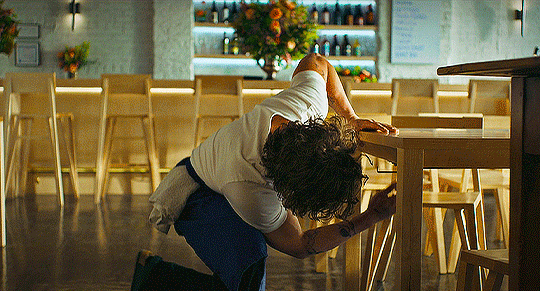
Started off with making sure she's comfortable
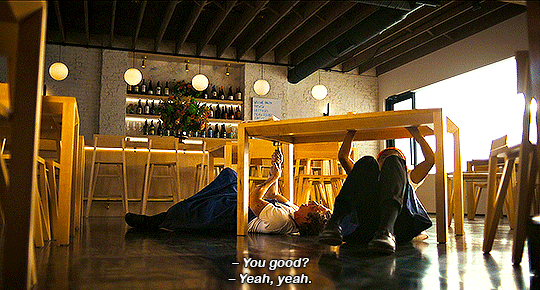
Reassuring her that he wants her

Switching positions
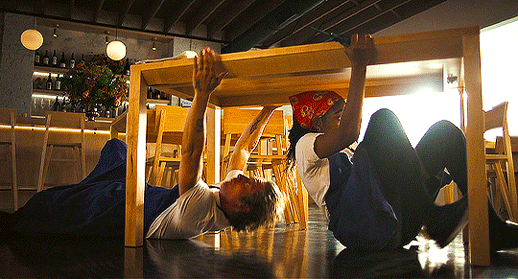
Sweet talking her and telling eachother how much they like each other





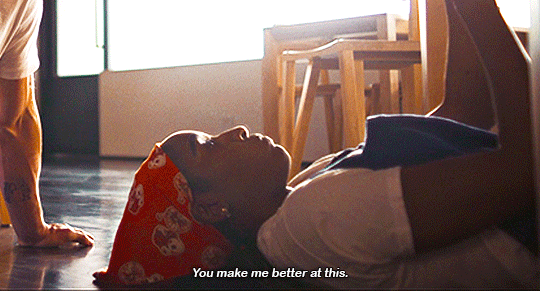
Dirty talking (about food)


Finishing and start pillow talking and reassuring her that he's there for her no matter what
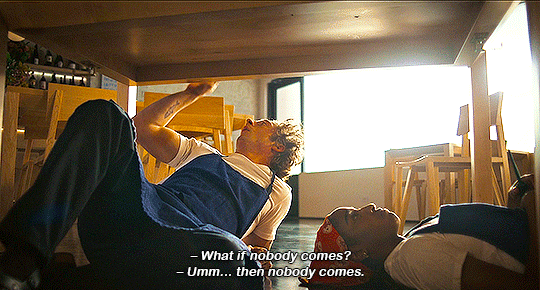

Getting up all disheveled and fixing her clothes


Giving her clothes to put on

#they're so unserious#sydcarmy#the bear#carmy x sydney#sydney adamu#carmen berzatto#chefs kiss#platonic and messy#the bear fx#charged and sexy#screwing under the table#the bear meta
885 notes
·
View notes
Note
Tell me your opinions on the stuff. Any stuff.
Grins. Smiles, even
I'm using you as an excuse to infodump my theory about the Island because I've had no in to do that, and my theory is pure opinion. Anyways:
THE ISLAND IS STUCK IN THE FUCKING FUTURE
(SCARE CHORD)
Hi so you might ask me. What the fuck do you mean by that. Well. Let's start with what we know about the Island, the King, and Wish Craft. (long ass post under cut. sorry)
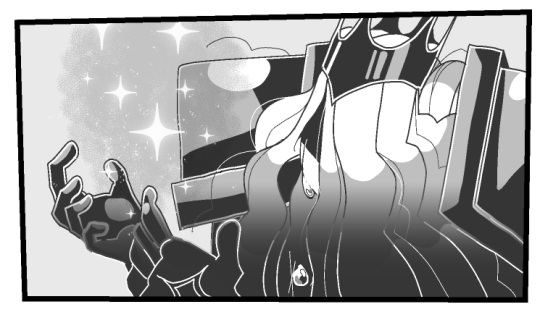
The Island was redacted from the perception of outside world, via Wish Craft.
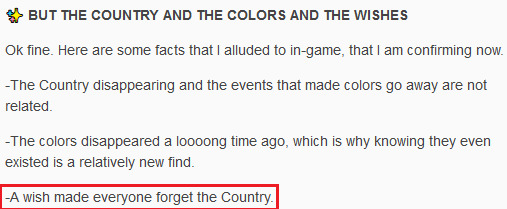
Wish Craft has the power to enable Time Craft. We see this primarily through Siffrin's timeloops, but also through the King's powers.

One of the King's powers is to show the saviors a "vision of the future."
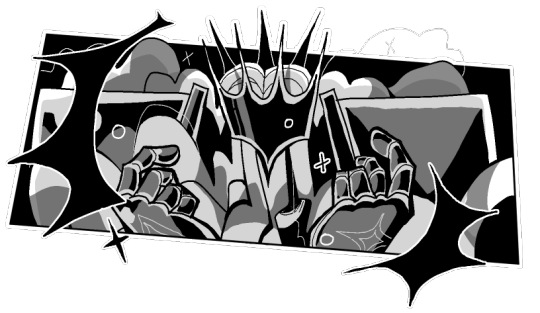
...And this same attack is deflected back at the King by Mirabelle in ACT 5, in which the King is able to see the Island before being frozen in time.
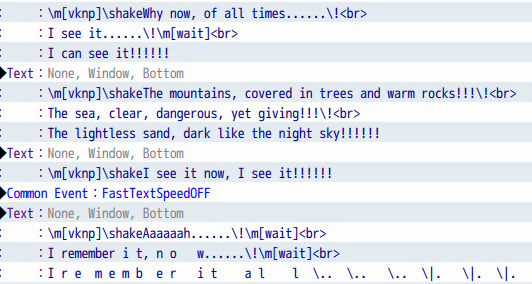
...So. The King's "vision of the future." We're never told explicitly what this vision is. All we know is that it's apparently powerful enough to wipe the party in one hit, hearing it from a distance hurts your head, and that whatever Siffrin (and Loop) saw, they don't seem to actually be able to describe it. Even the King himself doesn't know what his vision entails.


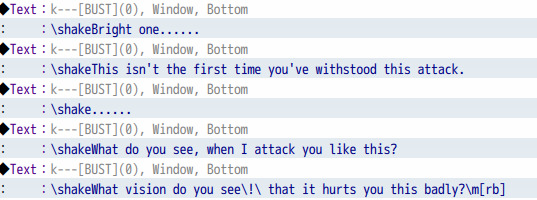
We don't know whether the party all sees the same thing when struck by the vision, and Adrienne's answer to the question about it in the Reddit AMA is. vague? It's not a "no," and the specific wording makes me think the answer might be yes. But that's me reading into it.

Now. What do we know about the Island's redaction? The Island was affected by the wish recently, as in "like a decade ago" recently. We know that nobody in Vaugarde or the rest of the world is capable of thinking about the Island, anything closely tied to the Island's culture, or people on the Island for very long. When they do recall these things, they slip right out of reach. Particularly, the consequence for trying to think about the Island (or, more specifically, break the wish that forces the Island out of perception) is significant pain, localized in the head.
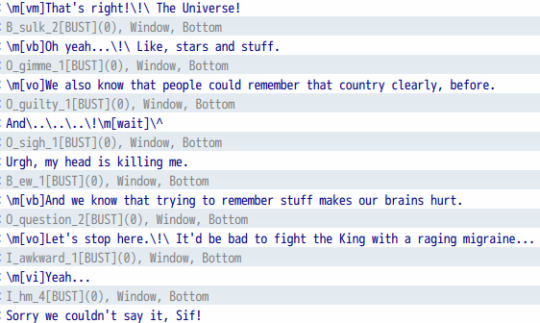
And that said pain is enough to become lethal, if pressed hard enough.
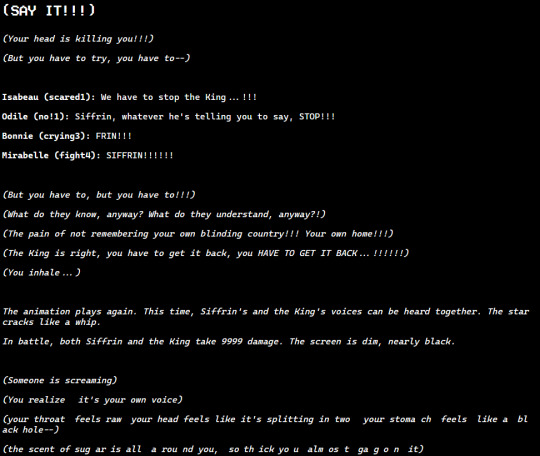
From here forward I'm running with the assumption that the King's "vision of the future" is not personalized to any individual, and is unchanging throughout the course of the whole story. Now. Remember the end of ACT 5, where the King gets hit with the deflected "vision of the future", and instead of dying, he recalls the Island and gets frozen in time? Very odd, yeah? Why wouldn't the King just die like everyone else does? He even does take 9999 damage when trying to say its name, like Siffrin does, and like the party does when they're hit by the attack.
Well. We know that he has a "true wish" that the ability to freeze Vaugarde in time grants. I don't think it's at all a stretch to guess that the King's "true wish" is to be able to remember the Island. My personal guess is that the King (and Siffrin) brought this "true wish" into effect via the "SAY ITS NAME" sequence- he even tries three times, a significant number in wishing.
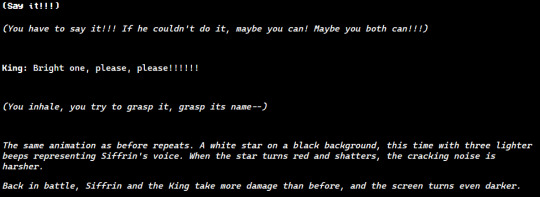


The King (and Siffrin's) wish breaks, because it can't be fulfilled in this moment without breaking the wish to prevent the Island from being thought about. However. Consider the conditions at the end of ACT 5- the King sees the vision of the future reflected back to him, and what he sees is the Island. He remembers the Island, fulfilling his own wish, and is frozen in time. I consider this a compromise between his wish and the one binding the Island- the King gets to remember the Island, but nobody alive is able to think about it, because he's frozen in time; it's like the Universe is correcting itself (I WILL GET BACK TO THIS). The wish of all of Vaugarde to defeat the King is fulfilled, since he is no longer a threat, and Siffrin's wish wraps itself up soon after.
MY POINT BEING. The King's attack is a vision of the future. This "future" is of the Island, in some uncorrupted state. The saviors see it when he attacks them, and he sees it when it is deflected back to him.
The logical next question is "okay, so the Island exists in the future, but how do you know time shenanigans are even related to the Island?"
Recall a very odd series of interactions throughout the game, in which you try to interact with a piece of equipment that you already own.
The game rewinds slightly, before the item disappears, as the Universe corrects itself.

This is awfully similar to two particular events: looping back without seeing the death screen, and talking to the Daydreaming One about her sister. The latter is more interesting to me for the purposes of this theory.
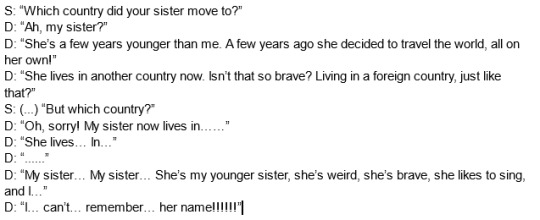
youtube
In both instances, something is misaligned within the Universe (an item existing in two places, someone remembering something they're not supposed to) and it is corrected through some sort of rewind. Also compare the dialogue above to when you try to give Mirabelle the Stylish Bow when you already own it.
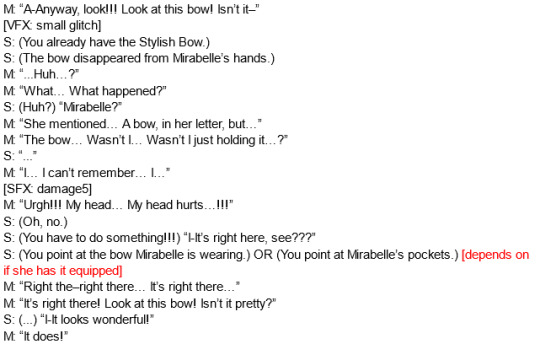
The world glitches, but Siffrin defuses the situation before the Universe has to intervene. Omitted from the screenshot is the fact that Mirabelle's portraits switch to happy from "catastrophically anxious" with no transition after Siffrin shows her where the bow is. Important to note is that when Mirabelle tries to recall receiving the bow, her head hurts, much like how trying to break the Island wish causes a headache.

The Universe leads you away from perception, and you can only follow.
My theory that I keep circling around is that through Wish Craft, the Island has been displaced temporally. The denizens of the Island, as well as the Island itself, still exist, but they are in the future. The Island is still loaded into the world, like how equipment is before you try to interact with it, and the Island cannot leave this quantum state, because it never actually went anywhere. The magnitude of the redaction event is so severe with the Island, because it is so much larger as an entity than a sword or a bow. There are of course things I don't really have pieced together, like why somebody would wish the Island into the future, how far into the future it is, or why equipment behaves this way. But it's the only Island theory I've seen that I have some level of confidence in, so I might as well lay out my cards for it.
#asks#this counts as an opinion right? idk#isat meta#isat theory#isat spoilers#isat#sorry i fucking love talking at people but im terrible at coming up with things without a hook so im just saying Any Words#also i cant have opinions without citing my sources.#i'm literally not even the first person to come up with this theory but it has been slowly eating away at my mind for months#and since that one person in isatcord who is smarter than me brought it up i havent really seen this theory in circulation#so i've been wanting to make a post compiling evidence for it for like. fucking forever#sorry to dunk you guys in images hell but like. I need you to See It. See my vision. of the futu- (is shot)#thank you feli as per always your website is so sexy andawesome and cool and it's the best forever.#(SORRY FOR THE YT EMBED BTW. TUMBLR HATES MEEEE)#this is not the most cohesive theory in the world via both my terrible explaining abilities as well as the holes i mentioned#but i think it's an interesting theory and i want to share it. sorry anon
390 notes
·
View notes
Text
what's fun about shipping Tim with Dick, Jason, or Damian is he has, at some point, hallucinated all of them to comfort himself. even when he doesn't like them or particularly get along with them, he has to imagine/hallucinate them just so he has the power to go on. Tim's concepts of the Robin mantle and what it should be is so fun, because he respects the others through the Robin mantle. Tim worships Dick because he was the first Robin. he wouldn't be Robin if Jason hadn't died in the mantle. and a lot of his frustration with Damian is he feels Damian isn't honoring the mantle correctly. when you ship Tim with the other Robins you can't divorce their identities as Robin from it because Tim will always see them as a Robin first and that's so fun and fucked up. like.


batman (1940) #456
Tim perceiving Dick as *Robin* cheering him on, not Nightwing, which is the version of Dick that Tim actually knows? that's just. wild of him. he will always view Dick as Robin first, his personal hero but also the original of the legacy. his love for Dick is shaped by that.
and then of course, even when he's hallucinating/imagining Jason cheering him on, it's *still* through the lense of being reminded how Jason failed? subconsciously believing that Jason got himself killed because of his actions, and that being a lesson for Tim to learn from? Jason isn't a person to Tim, he's a moral lesson about how to be Robin. any potential idolization he could have of Jason isn't because he loves Jason, it's because of the lessons Jason's death taught him.
and then, even though him hallucinating TIm is from the New-52, which makes characterization all kinds of questionable, i do think it makes sense for TIm to hallucinate/imagine Damian after Damian's death in an attempt to cope with it.

teen titans (2011) #18
to an extend, he sees Damian's death as in part his own fault. and even hating Damian, Tim needs the comfort from this to cope with Damian being gone. he's angry that Damian even was Robin, and has to learn something from Damian's death and how it impacts the Robin mantle, and teenage heroes as a whole. like, Tim can pretend he hates Damian all he wants, even getting taunted by the image of Damian, but there's still an underlying love to their relationship.
i think that's just the fun of shipping Tim with any of them. you will never divorce Tim's views of them from the Robin mantle and how fucking Unwell he is about anyone else who's been Robin before or after him, to the point he has to hallucinate them comforting him when he's at his lowest. it's always going to be a little unhealthy, a little toxic, and driven by Tim's relationship with being Robin as well. i need more Tim being weird about Robin in these ships.
#necrotic festerings#batcest#jaytim#dicktim#damitim#this post was first going to just be about tim hallucinating damian but i got carried away thinking about the identity crisis arc#have whatever this is.#idk if there's much of a thesis other than “tim's fucking weird about the robin mantle and that should extend to shipping too”#been meaning to post this for forever#finally got around to it though so yay me.#now i need to go work on my jaytim in the new-52 thoughts bc. i have a whole post planned.#a stack of comics next to me for research and everything. god help me.#ALSO while rereading to grab panels#why is it that everyone talks about how jason says “robin is magic” in an attempt to mischaracterize him as sunshine boy#and not the fact that tim *also* says robin is magic?#like it's not a jason thing. it's a robin mantle thing.#that's just what robin *is*. it doesn't say much about jason's character for him to say that when he's robin. it just means he's robin.#the robin mantle is magic. that's the point.#and you could argue that's more of a meta thing that exists on the wavelength of how children where supposed to project onto robin#moreso than an in-universe commentary on what the robin mantle is#(honestly the same argument applies to tim hallucinating here for like. meta intent vs in-universe meaning.)#i hesitate to even call it hallucination it's more like. daydreaming coping.#giving a face to his internal monologue type thing and this is just how the medium depicts it#also it was just sexy and cool for characters to hallucinate loved ones in the 90s in comics. it was a convention of the genre.#but still my point stands. tim pictures all of these ppl as robin first internally#and he self soothes using their image in his head. that's wild of him like what#tim you are weird about the robin mantle more than anyone else i give you that.
162 notes
·
View notes
Text
Been thinking a lot about how Fabian uses the word triggering. He uses it in reference to the sexy rat, to the term 'turncoat', and (i believe) about Chungledown Bim
And he says it like a joke, right? Like the point is that Lou is making a joke because haha a sexy rat and a mirror abandoning Fabian and a funny-named gnome that wants to shit in his mouth are all funny concepts so why shoudn't it be funny that they're traumatizing
Except, I think Fabian is using that term earnestly. I think he is genuinely upset by how a sexy rat wanted to violate him in the nightmare forest and that in order for him to progress he had to lay down and give coerced consent to it
I think he is deeply hurt by people he loves leaving him. Sure, this time it's a mirror being a 'turncoat', but it's also his mom going on vacation with Gilear. And thinking about how Fabian interacts with Cathilda, treats her like a parent and a caregiver, you have to think that his dad was at the very least emotionally unavailable (if not physically so) and we all know about his mom's sensory deprivation egg
I think Chungledown Bim terrifies him in ways he can't articulate. The representation of how he's fallen short of his father's legacy persuing him endlessly. Being given spells and wealth and access by his devil father. Tracking him down to degrade him in an extremely visceral way
Fabian says that things are triggering with a smile on his face and a laugh in his voice. He's learned that saying the uncomfortable thing means money being thrown at a problem. He's learned that you're supposed to distance yourself from your feelings, to self-medicate
He doesn't have the skills or the practice to tell his friends in all seriousness that the things they say bother him. Remind him of his hardest days - in Leviathan, the Nightmare Forest, the Red Waste
And the part that hurts the most is that if he had this earnest conversation, his friends would be there. They'd respect him. Maybe help him unlearn some of the lessons that have shaped this ineffective request for help in the first place
But he doesn't ask and he says it as a joke and they hear it as a joke and nobody heals
#fabian seacaster#fhjy spoilers#d20#fantasy high#dimension 20#chungledown bim#ecaf#the sexy rat#trauma#meta#character study#i think i still don't know what character studies are
366 notes
·
View notes
Text
Dean's outbursts and occasional mistreatment of Sam in the later seasons stem from his new-rooted certainty that Sam will never leave him no matter what anyway. But, when someone else mistreats Sam, Dean's response is immediate and protective. He becomes exceptionally attentive and caring, almost to an exaggerated extent, ensuring Sam's well-being. The presence of a primary abusive figure triggers Dean's reverting to his role as Sam's primary protector, performing his role with such exceptional dedication tailored to Sam that it borders on too perfect like a high. And Sam considering his history he doesn't work too well resisting temptation and these intervals of extreme high even if in the long run there'll be downs that are outright harmful to him. That catalystic payoff diminishes everything else in Sam's possibly tunnel visioned rationalizing of things. Especially when it comes to Dean because that's when his call is mostly distorted.
This cold-and-extreme-hot, robe-pull that Dean performs with Sam intentionally or not. Both Sam and Dean are acutely aware that Dean is uniquely positioned to affect Sam profoundly; he possesses the singular ability to bring Sam down to his lowest points, while simultaneously being the only one who can elevate him to his highest peaks. This dynamic solidifies Sam's belief that no one will ever treat/know him so good to 'him' as Dean does. And Sam who never resisted his addictions just loses himself completely in it and chases it the duration of his life.
Sam cements the notion that his safety and happiness are inextricably linked to Dean.



#this is sexy btw#samdean#wincest#sam winchester#spn#spn meta#dean winchester#mine#tbh every introspection i do is never an absolute full-fledged interpretation more like i entertain ideas/possibilities that might line up
160 notes
·
View notes
Text
Carmy stares more: a compilation
'She-she-she is, she is great, yeah.
yeah so great, it scares the shit out of me'
Brb going to bawl my eyes out, Richie at the end is me when they get together in season 20!
Song: Giveon ‘Like I Want You’
#all these two do is eye fxxk#surprised they had time for a reno as well#shout out to the editors#baby this is not for me#sydcarmy#the bear#sydney adamu#carmen berzatto#the bear meta#charged and sexy#carmen x sydney#sydney x carmy#the bear fx#ayo edebiri#jeremy allen white
517 notes
·
View notes
Text
Okay but there's something deeply sad about the fact that this is the only Apogee Solstice Caleb (and probably many of the wizards working on all of these problems) will see, a massively powerful arcane event that can be used to do incredible, miraculous things, and because Ludinus had to be an absolute bitch, he's here doing this bullshit where he can't even have fun with magic because there's a dispel running once a minute.
This is Caleb's life's work and it is hugely important to him, and I'm sure he's made his peace with that, but at the end of the day, the fact that he is pursuing this to its end is a duty born of guilt and trauma. It's not simply something he is doing because he wants to, it's something he does because he must, and no one else will or can. Magic is something he loves on such a more fundamental level, from even before Trent, and still now he has to push that aside in order to focus on this.
Caleb Widogast can, must, should, and DESERVES TO chomp Ludinus Da'leth in half as a spellcasting motherfucking dragon.
#I hope essek and yussa are off implementing some ridiculous experiment that caleb helped design#anyway let caleb be so sexy and also chomp.#cr spoilers#caleb widogast#cr meta#surprise surprise I suddenly have so many thoughts now that a wizard was on screen#always tbh
1K notes
·
View notes
Text
crowley and aziraphale being sexy is not mutually exclusive from them being asexual. y’all do realize that, right?
i’ve seen people say “i just want them to be ace icons, they’re an old gay couple they’re not meant to be sexy!!” and while that’s well intentioned and i can see where you’re coming from, i have to disagree.
don’t get me wrong, i don’t necessarily want a sex scene in canon. i did and still do read both of them as ace. the wanting them to be ace is not the issue.
i take issue with the reasoning some people are providing. let me put this bluntly: old people can and do have sex. old straight couples have sex, old queer couples have sex. being old is not synonymous with someone not being sexually active. and it says a lot about how you all view aging and old people when you act like old people can’t get it on.
secondly, aziraphale and crowley can be sexy and also never have sex. ANYBODY can be sexy and never actually have sex. because sexy is vibe, it’s a state of mind, it’s about your physicality and the way you carry yourself. you can think someone is sexy and never want to fuck them, you can think you yourself are sexy and not go any further than that.
so yeah, crowley can look hot and sexy in his turtlenecks and waistcoats. and aziraphale can look sexy in his waistcoats and button downs. you can look at david tennant’s jawline and be enamored and you can look at michael sheen’s nose and think it’s beautiful. and they never have to actually have sex with each other for any of that to be true. sexiness does not necessitate sex.
not to mention, every time i see the “they’re an old gay couple they don’t need to be sexy!!” argument it feels very much like sanitizing queer relationships and love for the sake of cishet comfortability. too often queer people are not allowed to be sexual, or for fucks sake, not just sexual but physical with their significant others. because physical manifestations and displays of queer love make the cishet world uncomfortable. and not allowing that kind of physical love to exist in media only serves to further perpetuate the issue.
queer love and queer people don’t have to be palatable to a cishet audience. queer love should get to exist authentically and queer people should get to exist and present in however way they see fit.
and in the context of good omens i think that means letting aziraphale and crowley be sexy even if they never have sex. that means letting them be physical in their love. because queer people deserve that, especially old queer people
#i don’t even know if this makes sense but here ya go#can’t believe i (an asexual) unironically wrote ‘sexy is a state of mind’ in an otherwise serious tumblr post#anyways let aziraphale and crowley be sexy even if they never have sex#asexual aziraphale#asexual crowley#asexual aziracrow#aziracrow#ineffable husbands#ineffable wives#good omens#crowley#aziraphale#good omens 2#good omens meta
356 notes
·
View notes
Text
The Clones, Kamino, and Relationships
I've long speculated on what the clones' values would be as a people regarding every type of relationship they could possibly have with others around them -- antagonistic, romantic/sexual, professional, platonic, familial, etc.
Often times when making headcanons along these lines, people tend to project their own social upbringings onto the clones with or without realizing; they rely heavily on a reality that doesn't exist for the clones and then try to justify it with the same reality. Their analyses and theories and hcs end up flawed (and, for me, really annoying to read).
I'm sure you've all heard the fanon/headcanons that clones don't have the necessary and nebulously-defined "life experiences" that are required to mark them as adults. People think the clones lack a certain amount of knowledge about themselves and their bodies, and then others' bodies and how those work. They think the clones have no social awareness; I even saw someone say that clones wouldn't have had rivals, frenemies, or any negative interaction with other clones.
This long form and hopefully structured rant is going to lay out everything I think about how the clones were raised, why they're raised that way, and what that means when they interact with one another and with non clones.
Antagonistic Relationships
The clones argue. They fight. They disagree. We see this repeatedly in The Clone Wars and all throughout the Bad Batch. They disagree with superiors, both Jedi and non Jedi.
Disagreement within a group helps foster social bonds, can strengthen critical thinking/reasoning, and has a few other benefits I don't feel like listing out right now. Regardless, managing disagreements in a group requires conflict resolution skills.
The General Relationship Structure on Kamino
The clones must be taught to be loyal, to be amicable, and how to resolve conflicts within squads and bigger and bigger groupings of clones. The clones are going to war. They're trained soldiers. They have to be able to work on a team. Team work isn't just following orders and it isn't just being friends. That also means swallowing pride, setting aside ego, and even speaking up.
They can get jealous, they can be envious, they can have a whole host of complex feelings and emotions that they need to work through. The Drill sergeants would thus be instructed to be aware of and teach the clones who to work through this (whether they choose pats on the head or a fist is up to them).
I'm saying this to say that fandom often takes clones' "guns n battle" education a little (waaayy) too literally. They're not just given a gun at 2 and told to start firing. They need to be told that you can't turn that gun on your brother just because he said something annoying or you think he's dumb.
The Galaxy Outside Kamino
The clones learn about the galaxy outside Kamino. They get a heavily censored and propagandized history of the galaxy that plays up the Republic and absolutely villainizes anyone else, but they definitely do learn about the galaxy in general. They learn about other species, where those species are located, etc.
I say this to say that people like to act like the clones are so sheltered that they basically gawk at the mere existence of anyone who isn't a clone (so like....racist via ignorance?) which....I don't understand, really. The Kaminoans want to deliver a functioning and high quality product. They can't do that if they don't tell the clones that there's people out there that look different frmo you and speak a different language. A lot of clones are bound to interact with civilians; what sense is there in not prepping them for it?
These history lessons wouldn't even take too long to learn or anything like that. Some people like to headcanon that the clones' education schedule is so tight that they can't learn about "unnecessary" things (i.e. anything that isn't about guns n battle). But the clones are also fast learners. I think they can handle like two days of lessons about the galaxy's species.
Learning about the galaxy also requires --
Social Awareness
I've often seen headcanons that the clones, in one way or another, lack social awareness. "Non clones are basically an alien species! They're bound to ask loud, rude, ignorant, offensive questions! They're not shy, so they'd totally just strip in public if they need to!" (yes, I saw someone say this)
This comes from people infantilizing the clones and refusing to write or see them as the adults that they are. This is also severely shortsighted; again, being aware of the fact that the Kaminoans want a product that can do its job, who is helped by the clones blundering through greater society and destroying the genpop's trust in and comfort with them?
The clones get taught the basics of social politeness. They wouldn't manage the intricacies of cross-cultural interaction from two like high level senators, but that's not their job. They're polite, they're professional, they're aware of what is and isn't rude. They're self aware. They're adults.
Personal and Bodily Awareness
Sorry to the people who are weirdly misogynistic, but the clones also get comprehensive sex ed. It's inevitable that some clones are going to sleep with a non-clone. It's bound to happen! Rather than pretend it never does, the clones are told in detail about two things:
The human reproductive system.
Basic contraceptives and STI prevention.
part of maintaining the health and safety of any given population is making sure that they don't get sick. STIs are a way of getting sick. Part of maintaining the health and safety of a given population is managing unwanted or unexepcted pregnancies. Condoms prevent that. I think the medics have them and distribute them as-needed when they go on leave planetside.
So they get consent training (they'd have to, in order to learn how to interact with anyone ever in a normal and healthy way). The contours of consent would interact with their lifestyles in a contradictory way because they're also rather explicitly told they don't have the right to give/revoke consent over their own bodies, but they're at least told about other's bodies.
But here's the thing. The clones rarely. RARELY. Do end up having sex or a relationship because of two reasons:
They rarely interact with non-clones who are viable for sexual or romantic relationships (as in, most of the non-clones they're in contact with are COs and Jedi)
They themselves do not value sex and relationships to the extent that we do in our society.
for the first point: they're in battle a lot, and when they go on leave they face a society that does not like clones. There are anti-clone protests, 79s is one of the few bars that allows clones in, and when they're at battle they're notably not interacting with civilians for obvious reasons. The average jedi and non clone CO is not going to seek a sexual or romantic relationship with a clone.
This also presumes that clones don't sleep with other clones. I'm not giving ground on this. It's clear within canon that the clones view each other as true family. "Brothers" is not just "brother in arms", but quite literally a familial term for them. Fives' "same heart, same blood" speech in season 3 is evidence. Sister being called/naming herself Sister is another (her being transfem alone isn't enough; if they didn't view their familial relationships as fundamental to who they are, they would have given her a regular name, not Sister). They also refer to one another primarily as brothers, even when there's bad blood -- like Slick insisting that he did loves his brothers. Not comrades or friends or squad mates. Brothers. The entire 501st.
Frankly, the "they're bound to do it" view that many people seem to have is very bizarre to me. Who cares about proximity? What are their values as a people? What have they been taught? What do they believe? Why assume that any given clone would do that? Plenty of people spend a lifetime around their families without ever developing a desire to sleep with them. Who you grow up with can absolutely influence who you're attracted to, but not to this degree.
The assumption that clones MUST sleep with one another relies on a rather wide series of assumptions that just do the thing I complained about in the opener, which is rely on our own culture's values to write the clones. Which ties into point #2 up above:
The clones don't value sex or relationships as something they need to seek out. Yeah, they'd get horny. They're adults. It happens! Part of life. But what's socially considered an appropriate release of those feelings would be different from what we see in today's world. The drill sergeants wouldn't impress upon them the importance of having a partner, because how does that help them? How does it benefit the Republic, the civilians, the clones?
The clones are soldiers who were bred for war and are focused, first and foremost, on fighting and fulfilling their duty. Their most important social values are fighting, duty, and loyalty. Hierarchy, warfare, survival, etc. Can a clone seek out sex? Yeah! Is that even like, remotely common given the points I made above? No! Does the average clone chase civilians or even dream about relationships, sex, etc etc etc? Nope. They weren't taught to value it.
(This isn't to say that wanting these things makes a clone bad at their job, or that having sex means they're breaking a rule somewhere. They're not. it's just like how the majority of college students go for the most common majors because they're taught that those are valuable and desirable things to learn in school. You'll get one or two who have a concentration in something you've never heard of. They're not wrong for that, but they're definitely outliers)
So the average clone is a virgin that doesn't even think about it because it doesn't matter to them. They know about both male and female reproduction, and they know how to interact with civilians.
They're definitely sheltered. I highly doubt that any clone is given the skills necessary to manage like, romantic relationship problems, especially the really gritty ones. They're not told about their rights as beings, their ability to say no to most situations that involve a military CO. But they know about saying please and thank you, solving interpersonal conflicts, and about pads and tampons. They know about boundaries, appropriate behavior in public, and how to use a condom. They know about girlfriends and boyfriends and partners, they just don't generally care about them. They're rare -- not socially shunned, just rare. like the niche college concentrations.
A really good meta to read that I personally love is written by @canichangemyblogname and linked in his pinned. @saga-ordsmed also has a few interesting metas floating somewhere on her blog. theyre not about this topic in particular, but she's got interesting insights into the Republic.
I hope this was coherent enough. I wrote this mostly because I saw a contradictory post that pissed me off and I was yelling about it with friends in discord lol. Basically, the clones are adults, but don't presume that they have the same values that we do, or that the poeple in charge of their care and upbringing share our values either.
#ch posts#captain rex#star wars#fives#the clone wars#all the bros#clone troper#meta#commander wolffe#oooh the way this fandom treats clones gets on my nerves#a monumental inabilty to think outside the upbringing most of them have seen or experienced themselves#the presumption that the clones share our values but also dont know how to act in public and cant be trusted#the extensive and pervasive born sexy yesterday trope like AAAHHHHH use your BRAINS#this is like years ago when fanon was that the clones couldnt swim#fanon was bad enough to write jokey misogynistic fics about the clones esentially sexually harassing every woman around them#i still see fics about the clones not knowing how babies are made and its like if uou expect them to be having sex#bc these people always do#why would they. not know about that. who benefits from them not knowing. how does it make SENSE#tcw#swtcw#ugh.#kamino#clone headcanon#clone headcanons#ct7567#star wars meta
80 notes
·
View notes
Text

Girl, what? So wtf was the Alley Talk in Brigade, the Stock Talk in Sheridan, the Family Style-Two-Tops-Booths? Talk in Braciole, the Apartment Talk in Pasta and the Table Talk in Omelette??? Not to mention Syd and Carmy hugging it out post fire suppression test in Bolognese and staring lovingly into each other's eyes right in front of Marcus in Omelette?🤨








#the bear#sydcarmy#the bear is a love story#<not marcus and sydney's though - sorry to sydmarcus girlies#platonic and messy#charged and sexy#sydney adamu#carmen berzatto#the bear is a mom and pop restaurant established in 2023#carmy x syd#carmy and sydney#syd x carmy#carmen and sydney#carmen x sydney#sydney x carmen#the gag is most sydmarcus' don't even really like marcus like that - how many of you write anything for him or think of him outside of#being an obstacle or alternative to sydcarmy??? where's your Marcus' mom's funeral fic and grief arc/meta for him???🤨#and i hate when people pull a 'representation matters' to ignore what is staring us right in the face because they think the creators#would win more representation brownie points if they depicted a relationship in a platonic rather than romantic light#nvm the fact that interracial relationships are still needlessly maligned and considered controversial in some quarters in 2023#and tina and ebra and nat and richie and fak and nat are right there doing the damn thing platonically - are they not???#what's not clicking?
336 notes
·
View notes
Text
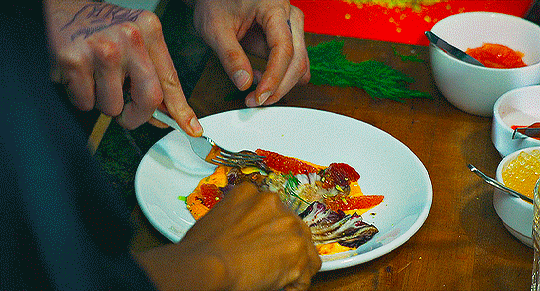
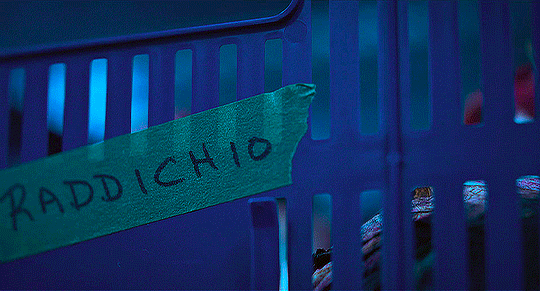

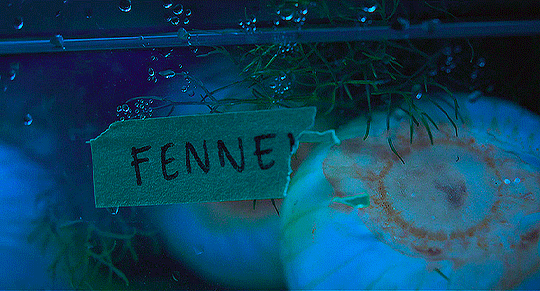


The way the only thing that makes Carmy crack a smile while being locked in the walk in is remembering the first and last meal Syd made him. Mind you, he didn't even try the fennel salad and the radicchio almost made him throw up.
#this idiot is so in love it's embarrassing#idiots to lovers#never in history has a man ever been so down bad#the bear#sydcarmy#sydney adamu#carmen berzatto#chefs kiss#syd x carmy#platonic and messy#carmy x sydney#charged and sexy#the bear fx#he's insane#who misspelled radicchio#the bear meta
929 notes
·
View notes
Text
OKAY so I am re-listening to "Death and The Queen" again and I am having Thoughts™.
I can't find any info about when this drama takes place continuity-wise, but my personal placement would be after "Planet of The Ood" (4x3) and before "The Sontaran Stratagem" (4x4) because 4x4-4x6 take place directly following each other with Donna stating at the end of 4x6 that she plans to travel with the Doctor forever. Donna's determination to continue traveling w him is in keeping with the conclusion of Death and The Queen, where she comes to the decision that the Doctor IS her "happily ever after," as it were. Placing the drama after "Fires of Pompeii" and "Planet of The Ood" also makes sense with Donna's desire in the audio drama to have a break from "the extraordinary" of traveling with the Doctor (specifically, horrific death and destruction,) which adds understandable context to her seemingly being so willing to leave the Doctor after searching for him for so long.
(Don't talk to me about the ending of Forest of The Dead. It's unlikely Donna would have left the Doctor even if she found Lee. Donna's desire to confirm whether Lee was real could be easily contextualized by her wanting to know how much of her experiences inside CAL were a fabrication, and what the supposed "perfect husband" persona would have said about her if it was drawn from her own mind. Also it was written by Moffatt so it shouldn't count anyway.)
ANyway, what I actually wanted to talk about. Notably, considerable emphasis is placed on Donna enjoying her role as Queen and especially caring for her subjects and having power to help people. A greater amount of text is dedicated to her talking about how as Queen she can care for her subjects than her love for Rudolph, even before the reveal that he is human(?) trash. Her attachment to the role of Queen that marrying Rudolph will grant her is established to be largely based upon her passion for helping people rather than luxuries associated with rank, especially in view of the montage of how royal life on Gorotainia is not as glamorous as she hoped but is still enthralled by being Queen. Later in the story, when danger has appeared, her main role in the story is sacrificing and taking the lead to protect her subjects.
Notably, when things start going downhill and Rudolph starts talking to her about the difficult choices that he must make as royalty she comments that Rudolph is “just like HIM” (the Doctor) and that she went with Rudolph to escape these darker aspects of her travels with the Doctor, specifically the hard choices that go with the role the Doctor plays in the universe (while she doesn’t connect these concepts directly, these two statements are placed very close to one another textually.)
Only when her relationship with Rudolph and role as Queen seems like it will involve some of the same dark choices that her travels with Doctor did does Donna decide she doesn’t want to be involved anymore, which is quickly reversed when she finds out she needs to become Queen in order to protect her people. (I love Donna. In case you can’t tell.)
The narrative has established that a large part of Donna’s attachment to her relationship with Rudolph is potential authority to help and guide people, and that her main interest in pursuing a life with Rudolph rather than her travels with the Doctor was her perception that her role as Queen of Gorotainia would not involve the same death and destruction she has seen with the Doctor. Perfectly understandable after experiencing something like Pompeii.
Donna’s compassion and empathy have been essential components of her character since her introduction, with her wanting to protect the Doctor despite being irritated with him and feeling sorrow for the children of a Rancoss that wanted her to be eaten in “The Runaway Bride”, her taking the time to mention Stacy in “Partners In Crime,” and literally everything in “Fires of Pompeii” and “Planet of The Ood’. Donna has always taken the time and the energy to think of others and work to protect them, even this early in her run. In view of how deeply she feels the pain of others, it is understandable that she would find the idea of a world where she could help others from a position of power without all of the death and chaos and destruction appealing, and her outrage at Rudolph for once again putting her in a position where she has to witness (and potentially be responsible for) terrible things happening to innocent people is believable. He proves that being a Gorotainian royal is like being the Last of The Time Lords. On a smaller scale, sure, but still.
So the text (and Donna) have set up the idea of Rudolph being similar to the Doctor in role, so what is the difference? Rudolph doesn’t much care about people. He is willing to sacrifice his own people quite coldly.
The Doctor does care about people. How good of a person he is, or how good of a job he does caring for people is up for debate, but he cares.
Which all leads me to this quote from “Beautiful Chaos,” that I cannot believe is cannon and real and published.
Why does Donna love the Doctor?
"I wish you could see what I see. We've been to places, to worlds, to futures and pasts you could only dream about. I think half of them I dreamed up because they can't be real. But they are. And everywhere we go, we make a difference. We put things right, we make people happier. That's what the Doctor is all about. He finds a way for the universe to make sense. And I love him for it.”
Donna Noble wants to make a difference. No matter where she goes, she cannot escape the death and pain and suffering and chaos and nonsense that is the universe, and she can’t help but want to help. And right there beside her, the Doctor is working to put things right too. And she loves him for it.
We have this entire drama dedicated to Donna wanting to make a difference, while also escaping the darkness of the universe, and she learns she can’t. There are no happily ever afters.
Except with the Doctor.
I have so many feelings guys.
#tendonna#ten/donna#feel free to interpret this as platonic if u want but this is why I love them as a couple okay#they are whole independent people who learn that if they stand together they don't have to carry the whole world on their shoulders#they understand each other and they have goals that are fundamentally compatible#how is that not sexy#ten x donna#doctor/donna#doctor x donna#donna noble#this is a Donna Noble Stan blog#tenth doctor#big finish doctor who#death and the queen#doctor who#not me being afraid my old English lit teacher will find my tumblr and give me notes on this#1K word essay lets go lads#dw meta#THE TENDONNA THESIS LIVES#I AM FERAL FOR THEM#GRASPS UR SHOULDERS AND SHAKES VIOLENTLY “THE POTENTIAL!!!!!”#okay so maybe Rudolph kinda cares but he has the spine of a wet noodle#not sure if any Rudolph stans are hiding out here tho#not gonna bash any other ships here but#is this not substantive??? Is this not compelling???
64 notes
·
View notes
Text
the scene of sam single-handedly playing corrupt lawyer for dean and absolving him of everything wrong he did was CRAZY the man legit gaslighted everyone in the room including himself
#sam is so sexy when he's like this#morally fucked up guy#remember when he was telling the guy who watched dean kill his father as a kid that dean had his reasons#or that he took on Michael bc he was trying to save sam and anything consequential to that was justified <3#the look on my face when he was pathologicaluing dean's unreasonable abuse of jack to jack like girl stop fighting for that man😭#he aint worth all at!!#alas sam's a freak and that's his soulmate so he's going down with that whatever whenever#I guess they were really made each other#and they say romance is dead#samdean#wincest#mine#spn meta
55 notes
·
View notes
Text
Sydney is the reason for Carmy’s sudden interest in ‘fun and amusement’
The person that Carmy describes himself as being after losing touch with Michael doesn’t seem like someone who has ever sought out fun or amusement, in fact it seems like he’s never experienced pure unadulterated fun in his entire life. Within his family dynamic he’s the youngest of three with an abusive mother and an absent father. He adores Mikey, truly looks up to him and respects him, Mikey of course does love Carmy, but Mikey loves him in sprite of all his quirks and eccentricities. Heartbreakingly Carmy has had too dumb down what would have bought him amusement and enjoyment to fit into the dysfunctional family and not seem ‘gay’, it’s the crux of his existence. With that in mind, consider that his brother had very recently passed away, most people with that history would just plummet into a deep depression.
What changes during this time for him is Sydney’s presence. She walks into his life like a tornado and shakes thing up in such a way that he yearns for life and adventure not just passive survival. Sydney lives in her truth; food is fun, taking care of people brings her enjoyment. She’s nerdy about it unabashedly, she does her COGs and ‘randomly adds graphics’ and she wears her heart on her sleeve but lightly covers it to protect herself.
After his failed attempt to ask her out he returns to his barren apartment to google ‘fun’, so the next time he’s prepared. Carmen experiences amusement and enjoyment through Sydney hence he conceives an opportunity for him to have ‘fun’ under the guise of the menu creation. His relationship with food though daunting; is a safe space that both him and Sydney can share at this current awkward phrase in their ‘platonic but messy business relationship’. Sydney excites him and makes him feel alive!

Peep Carmy making sure Nat was gone gone before he started his fumbled locker room attempt, don’t worry we’ll get there one day. He’s keeping his private ‘amusement and enjoyment’ to himself for now but this developing love is so loud that they can’t control how it spills out at inopportune moments.
#thinking about the fun and amusement we missed out on because they aren’t ready#slow burns really be burning slow#rambling about fun#sydcarmy#the bear#sydney adamu#carmen berzatto#the bear meta#charged and sexy#carmen x sydney#the bear fx#platonic but messy#chefs kiss
381 notes
·
View notes